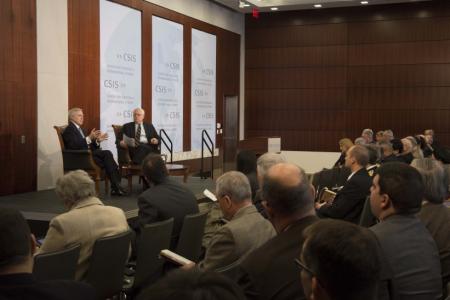Last Friday the Secretary of the Navy, the Honorable Ray Mabus, participated in the latest Military Strategy Forum discussion organized by the DC-based Center for Strategic and International Studies (CSIS). Ever vigilant, CIMSEC dispatched a fearless one-man delegation to the discussion. Below are some of the highlights of the event with the SECNAV.
With a few topics off the table, including the situation in Ukraine and the ongoing fiscal year 2015 budget negotiations, the central theme of the discussion revolved around the Littoral Combat Ship (LCS) and its future. In contrast with the speech made by the Secretary of Defense on 24 February, the SECNAV presented a more optimistic view of the contested vessel design and its prospects. By 2016, four LCS are expected to be on extended deployment. The Secretary further argued that the LCS should continue to be built through the current five-year defense plan, and, once complete, that further decisions should be taken based on the ship’s record, taking in account the costs of replacing it. As the LCS is only now beginning operational tests, there is no reason why the next flight of the LCS should not be modified. The Secretary cited the example of the subsequent flights of the DDG 51 and the Virginia class attack subs, which differ greatly from the original design. However, if modifications ultimately prove inadequate, the LCS will have to be replaced.
The second topic of discussion centered on the future of the U.S. Navy’s ‘Rebalance to the Pacific.’ The branch plays a crucial role, as it can brings presence and capabilities to regions in a way that the Army or Air Force cannot without more permanent basing or training agreements. However, according to the SECNAV, in order to ensure presence the Navy needs four elements: People, platforms, power, and partnerships. All are important, but none more so than partnerships. The United States relies on information provided by its partners, and fused from a variety of sources. That requires constant communication, relationships, trust, and familiarity. It is therefore crucial that the United States should reassure its partners in the Asia-Pacific that its rebalancing towards the region is real. To this end, the share of the fleet in the Pacific will increase from 55% to 60% by the end of the decade, and the contingent of Marines in Darwin, Australia, will grow to 1000 over the course of this year. Significantly for those keeping an eye on Washington’s rebalancing to the Pacific, the SECNAV emphasized that their role will not be restricted to training with Australian forces, but will include greater engagement in that part of the world.
The third, and perhaps key, point of Friday’s event focused on the future of the U.S. Navy in general, along with the sustainability of its current size and operational capacity. Secretary Mabus is convinced that the Navy’s size will reach 300 ships by the end of the decade, and that once reached the number will be sustainable. He did, however, add that the era of unlimited budgets, common a decade ago, has come to an end. Despite emerging constraints, he believes a combination of measures can cut costs and keep a 300-ship Navy afloat in the long term. This includes relying on mature technology (and crucially, not forcing expensive immature tech on new ships), disciplining requirements to keep them somewhat constant, fixed-price contracts, greater transparency in procurement, and relying on stable and tested designs. Here, the decreasing prices of the Arleigh Burke-class destroyers was cited as an example to emulate; as an increase in bids from two to three ships per year cut unit costs, without sacrificing quality. Other measures include increasing the share of biofuel used by Navy ships, for which the branch is cooperating with the Department of Agriculture and the Department of Energy. Here, the U.S. “fracking revolution” will likely not prove much help, as oil and gas are globally traded commodities. Every time the price of oil increases by a dollar, it ends up costing the Navy and the Marine Corps another 30 million. The Navy hopes that at least half of all fuel used will be biofuel by 2020. Four biofuel companies are set to provide 163 million gallons, priced at 4 dollars a gallon. Although not expanded upon at the event, this initiative forms part of the “Farm to Fleet” program unveiled in December 2013. Although designed to contribute to America’s energy security, provide jobs to rural communities, and ensure a supply of low-cost fuel for the Navy, the program has already proven controversial due to its mounting costs, amounting to hundreds of millions of dollars.
Cost-cutting measures will become increasingly important as the size of the fleet increases. A new amphibious group is set to be ready in the Pacific by 2018, providing Marines – not only those in Darwin, but all over the Pacific – with a spectrum of new options, including an improved resupply capability.
The event concluded with a few interesting tidbits, including on the need for a national debate on the upcoming – and expensive – Trident nuclear missile modernization; the deployment of laser weapons (coming into use this year); and, the F-35C (the SECNAV sees no problem with it being delayed, as the Navy was always the last in priority and the Initial Operating Capability has not changed).
Miha Hribernik is an Asia-Pacific security analyst and researcher, currently working with the Atlas Economic Research Foundation in Washington, DC. He is also an Associate of the European Institute for Asian Studies (EIAS) in Brussels. Miha’s research mainly focuses on the foreign and security policy of Japan, and maritime security in East Asia – with an emphasis on counter-piracy information sharing networks such as ReCAAP.



